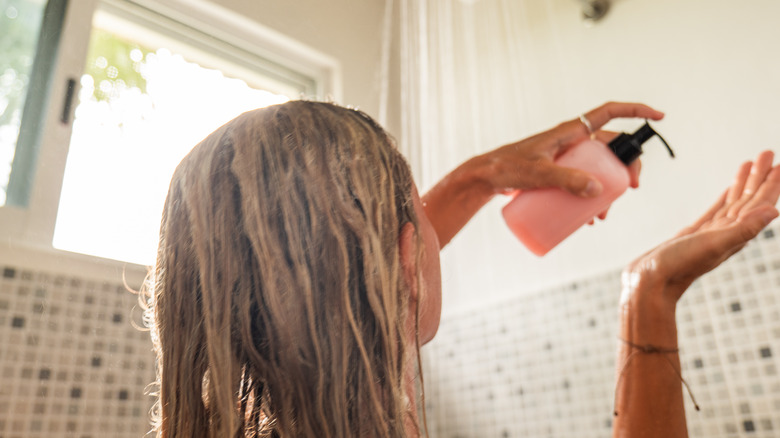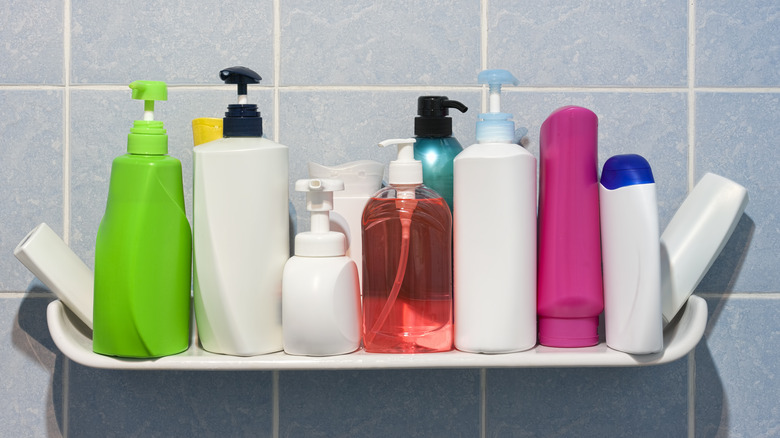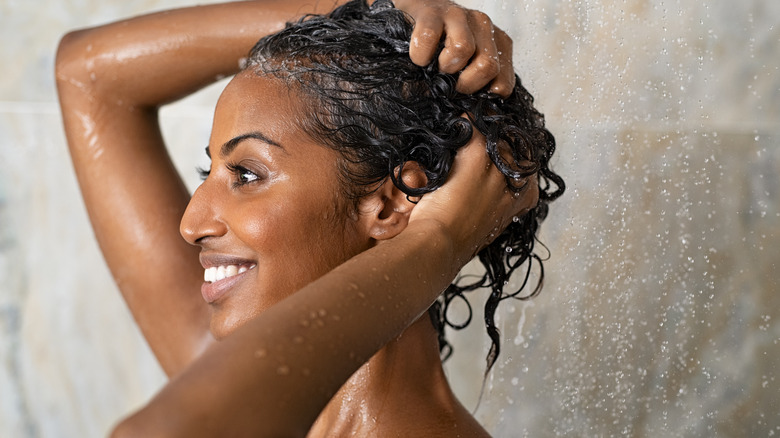Are Co-Wash And Conditioner Basically The Same Thing? Here's The Deal
Most of us have been taught to wash our full mop of hair only a singular way: scrub your scalp with shampoo, the comb through your locks with conditioner. Lather, rinse, and repeat, ideally every single day, right?
Not really. You gradually unlearn the habit once you get older, when you find out that washing your hair every day does nothing but dry it out. As it turns out, it needs some grease — just enough to retain moisture. Otherwise, you'll suffer from an itchy scalp and strands that are prone to breakage and damage. "Depending on your hair type, the length of time that is 'too long' to wash hair can vary," explained dermatologist Dr. Shilpi Khetarpal of the Cleveland Clinic. "For African Americans, this population should wash their hair at least twice a month. For other groups, at least two to three times a week to minimize inflammation and the overgrowth of normal yeast that live on the scalp."
Spacing out shampooing your hair? That seems easy enough. In recent years, though, experts have been advocating for a washing method called "co-washing," short for "conditioner-washing," which apparently involves cleansing your hair with conditioner. And if you haven't noticed yet, haircare aisles are slowly getting filled with co-washes specifically for this fairly novel washing technique, making things all the more confusing because they're apparently different than conditioners, too. But if co-washing means washing your hair with conditioner, how is a co-wash any different than a bottle of good ol' conditioner? Let's find out.
Co-washing and conditioning are the same, but different
Washing your hair with conditioner kind of spoils the experience of cleansing your head, for the very fact that there aren't any suds involved so you won't have that nice, squeaky clean feeling. But that tiny inconvenience may well be worth it as co-washing is said to benefit your hair and scalp. "The theory behind co-washing is that it's a kinder approach to clean your scalp and hair because the hair is able to maintain its natural oils and stays healthier without the harsh chemicals found in shampoos," board-certified dermatologist Dr. Anna Chacon, told Bestlife.
Co-washing rids your hair of dirt and grime without compromising hydration and moisture, and prevents the strands from succumbing to breakage. However, Faith Armstrong, pro stylist and director of education at Prose, shared with Byrdie that you shouldn't mistake a regular conditioner for a co-wash. "Co-washing will cleanse the scalp in a way that conditioner cannot on its own, as long as you focus your fingertips [on massaging] the scalp and [rinsing] thoroughly." A co-wash is a conditioner-based product, but it's not a conditioner. It has ingredients that "gently cleanse and remove product buildup," which regular conditioners don't have, said Jamyla Bennu, creator of natural haircare line Oyin Handmade.
It seems confusing at first, but it's pretty simple, really. When you wash your hair with a conditioner, you're only technically conditioning your hair, and not much else. But with a co-wash, you're both cleansing and conditioning simultaneously, which is what your hair (and your schedule, if you think about it) needs.
Is co-washing better than shampooing?
Co-washing isn't better than shampooing, per se, but it's "better" in the sense that it cleanses your hair without the risk of stripping it of natural oils. But your hair still needs deep cleansing once in a while, and a co-wash may not be the best product to use for that.
"For those who co-wash who need the occasional extra cleansing, it's important to stick to sulfate-free shampoos that don't strip already-dry hair," recommended stylist Miko Branch to Mindbodygreen. "And partner this with a once-a-week deep-conditioning treatment to replenish moisture and provide hydration." So the moment you find your hair extra dull and co-washing isn't cutting it, you may want to rely on your trusty shampoo to do what it does best.
And besides, co-washing isn't for everyone. It benefits those with curly and textured hair the most, but for straight-haired folks? Not so much. "This method is most suitable for hair types that are type 3 or 4 (within the universal curl guide)," afro hair stylist Michelle Sultan told Elle. "I feel that straighter or less wavy hair would be left feeling greasy or too heavy leaving it limp and less able to style."


